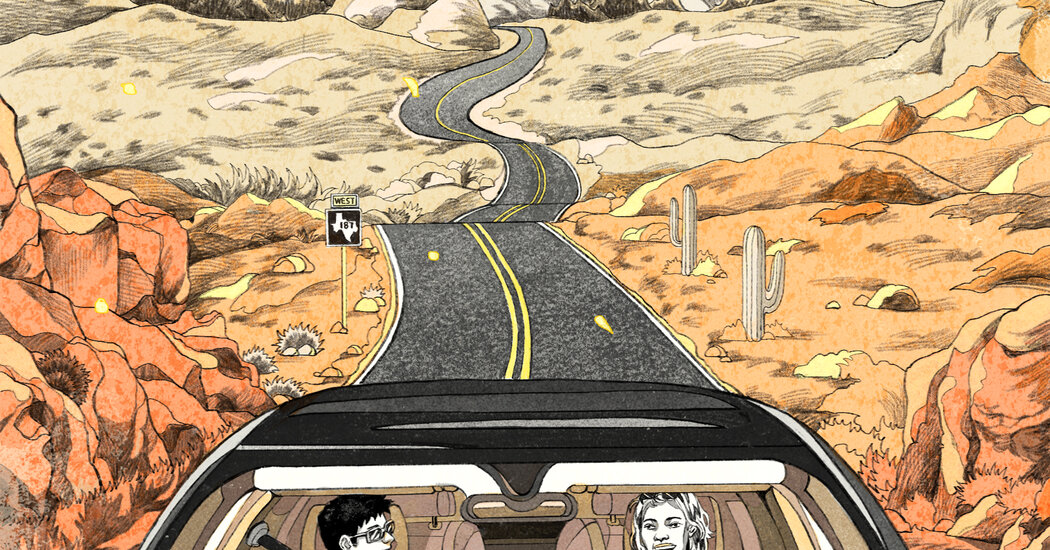Planning an accessible road trip is slowly becoming easier for people with disabilities. More resources are being created by and for the disability community, and the tourism industry is beginning to recognize the value of accessible travel. As a disabled, chronically ill, neurodiverse person, I take road trips every year and have learned a few tips and tricks along the way.
Car rental
Most major automakers offer adaptive driving devices in their vehicles at no extra charge. For example, Enterprise offers hand controls, left-foot accelerator, pedal extenders, and spinner knobs to make steering easier. Budget offers hand controls, spinner knobs, panoramic mirrors, swivel seats, and transfer boards. Be prepared to request adaptive devices at least three business days in advance.
Wheelchair accessible vans with ramps and lifts can be rented from mobility companies such as BraunAbility. BraunAbility is one of the largest wheelchair accessible van manufacturers in the country and rents in many locations. MobilityWorks is an accessible vehicle and assistive equipment dealer with rental locations in 34 states. AccessibleGO is a one-stop shop for accessible rental cars and wheelchair accessible vans and has contracts with 100 wheelchair accessible van rental locations nationwide. Request a quote on their website. With AccessibleGO rentals, you can request hand controls and spinner knobs at checkout.
Route planning
You can use Google Maps, Waze, or MapQuest for initial accessibility assessments using photos and Street View. Google Maps provides wheelchair accessible pedestrian and transit route guidance.
Sites like Roadtrippers and Furkot can help you plan your entire trip. While these websites aren’t specifically for people with disabilities, they’re very helpful tools (Roadtrippers’ search function has a wheelchair accessible checkbox). You can filter by destination type, like national parks or museums, and then search for hotels and campgrounds. With Furkot, you can input how many hours you want to drive per day, whether you want to stay on the interstate or scenic roads, and more. The app will determine the best route and length of rest stops, and suggest places to stay overnight.
Find a place to stay
Hotels and other accommodations must comply with the Americans with Disabilities Act, but many hotels do not meet all accessibility needs. Most booking sites list hotels with accessible rooms for people with mobility disabilities or those who are hearing or visually impaired, but this information is not always verified. Do more research on review sites and look for photos. Hyatt, Marriott, Hilton, and Fairmont hotels offer allergy-friendly and odor-free rooms in some locations. Call the hotel to confirm accessibility and make sure a specific room is booked.
Vacation rentals aren’t typically required to be ADA compliant, but some provide accessibility information. Airbnb recently introduced an adapted category with an accessibility search feature and homes scanned for accessibility. Review photos and contact hosts for details. Some hosts will make accommodations for you, like changing cleaning supplies or moving furniture, but you can also log your request using the in-app messaging system so customer service can address any issues you might have.
Wheel the World is an accessible travel agency offering reservations at over 3,000 verified accessible hotels across the United States. Hotels are personally reviewed by trained assessors and only hotels that meet our standards are featured. Register as a disabled traveler or companion and complete a personal profile that includes options to accommodate various disabilities and accessibility needs. The site will provide you with a list of matches to your profile with partial, suitable and excellent match options.
Food and medication
There are many ways to keep food and medications cold while traveling. Electric coolers plug into your car’s 12-volt outlet, but pay attention to the type of cooling mechanism. Cheaper types are usually thermoelectric and can only cool to about 30 degrees below ambient temperature (if the temperature inside your car is 70 degrees, they’ll cool to 40 degrees). Compressor coolers are more expensive but can maintain normal refrigeration temperatures.
Many hotels offer small refrigerators, and if you know you’ll be staying somewhere with a refrigerator most nights, layer a cooler with larger ice packs and essentials, then layer another layer of insulation on top, like a cooler bag. This way, you can keep everything cold for up to two days at a time.
It’s also a good idea to travel with a single-burner stove (electric if used indoors, propane if used in rest areas or campgrounds) and a camping mess kit so you can safely cook meals.
Some great apps to find food, restaurants, and grocery stores that accommodate dietary restrictions include Fig for allergy-friendly options, Happy Cow for vegan options, and Find Me Gluten Free for celiac-friendly spots. Add your favorite options to a route-planning app so you know where to stop.
Find an activity
In addition to the apps mentioned in the route planning section, state and local tourism organizations can also be useful sources of information about accessible destinations.
National parks and monuments are required to follow federal accessibility guidelines and usually have visitor centers and recreation sites with accessible features. Each park’s website provides information about programs and services within the park. Accessibility varies, but typically includes wheelchair accessible trails and campgrounds, tactile and speech capabilities, hearing aids, and American Sign Language interpreters.
State parks may not be consistent in their accessibility features, but you can usually find some information on each park’s website.
Apps such as AllTrails list wheelchair accessible trails across the country, but the information may not be verified, so check with the park or land manager to confirm. Parks with wheelchair accessible trails include Redwood National and State Parks, North Cascades National Park, Badlands National Park, and Great Smoky Mountains National Park.
Shiren Nagakiri, founder of the nonprofit organization Disabled Hikers and author of guidebooks such as “The Disabled Hiker’s Guide to Western Washington and Oregon” and “The Disabled Hiker’s Guide to Northern California,” leads and evaluates group hikes across the United States.

